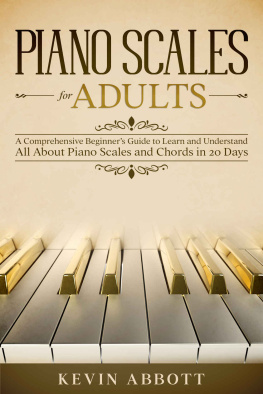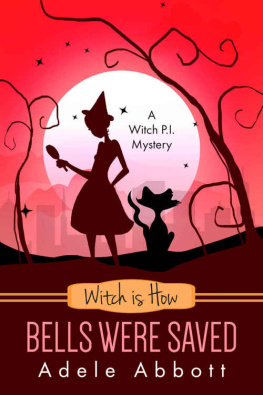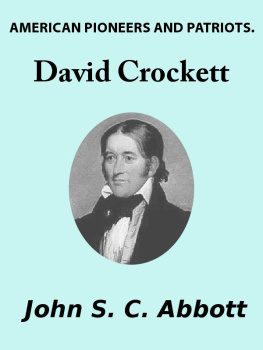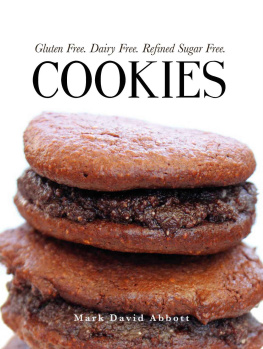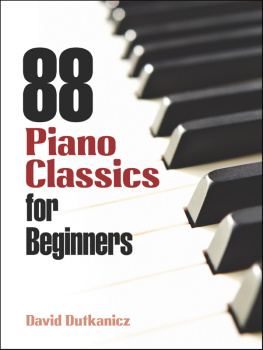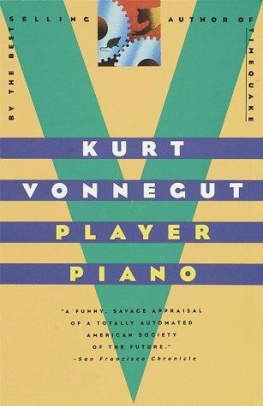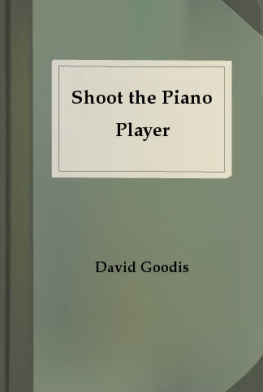David Abbott - The Upright Piano Player
Here you can read online David Abbott - The Upright Piano Player full text of the book (entire story) in english for free. Download pdf and epub, get meaning, cover and reviews about this ebook. year: 2011, publisher: Random House Inc, genre: Detective and thriller. Description of the work, (preface) as well as reviews are available. Best literature library LitArk.com created for fans of good reading and offers a wide selection of genres:
Romance novel
Science fiction
Adventure
Detective
Science
History
Home and family
Prose
Art
Politics
Computer
Non-fiction
Religion
Business
Children
Humor
Choose a favorite category and find really read worthwhile books. Enjoy immersion in the world of imagination, feel the emotions of the characters or learn something new for yourself, make an fascinating discovery.

- Book:The Upright Piano Player
- Author:
- Publisher:Random House Inc
- Genre:
- Year:2011
- Rating:5 / 5
- Favourites:Add to favourites
- Your mark:
- 100
- 1
- 2
- 3
- 4
- 5
The Upright Piano Player: summary, description and annotation
We offer to read an annotation, description, summary or preface (depends on what the author of the book "The Upright Piano Player" wrote himself). If you haven't found the necessary information about the book — write in the comments, we will try to find it.
The Upright Piano Player — read online for free the complete book (whole text) full work
Below is the text of the book, divided by pages. System saving the place of the last page read, allows you to conveniently read the book "The Upright Piano Player" online for free, without having to search again every time where you left off. Put a bookmark, and you can go to the page where you finished reading at any time.
Font size:
Interval:
Bookmark:
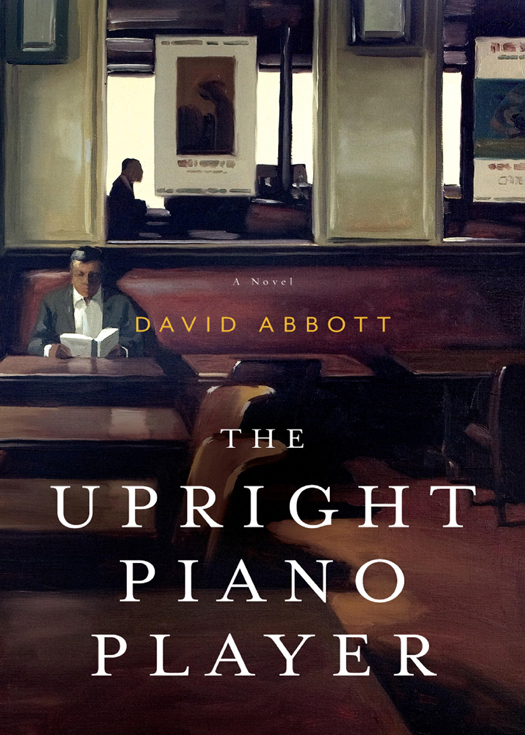
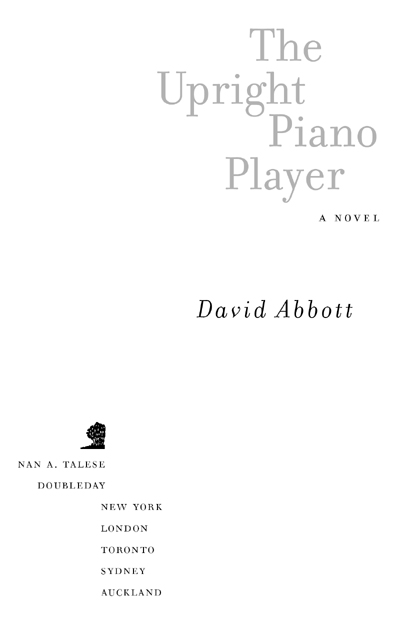
This book is a work of fiction. Names, characters, businesses, organizations, places, events, and incidents either are the product of the authors imagination or are used fictitiously. The authors use of names of actual persons, places, and characters are incidental to the plot, and are not intended to change the entirely fictional character of the work.
Copyright 2010 by David Abbott
All rights reserved. Published in the United States by Nan A. Talese/Doubleday, a division of Random House, Inc., New York, and in Canada by Random House of Canada Limited, Toronto.
www.nanatalese.com
DOUBLEDAY is a registered trademark of Random House, Inc. Nan A. Talese and the colophon are trademarks of Random House, Inc.
Originally published in Great Britain by MacLehose Press, an imprint of Quercus, London, in 2010. Published by arrangement with Quercus Publishing PLL (UK).
Grateful acknowledgment is made to Liveright Publishing Corporation for permission to reprint an excerpt from i will cultivate within by E. E. Cummings, copyright 1931, 1959, 1991 by the Trustees for the E. E. Cummings Trust. From Complete Poems: 19041962 by E. E. Cummings, edited by George J. Firmage, copyright 1979 by George James Firmage.
Cover painting: Rue des Boutiques ObscuresScene 1, by Denis Frmond. Private collection. Jacket design by Emily Mahon
LIBRARY OF CONGRESS CATALOGING-IN-PUBLICATION DATA
Abbott, David, 1939
The upright piano player/David Abbott.1st American ed.
p. cm.
1. Retired executivesFiction. 2. StalkersFiction.
3. StalkingFiction. 4. Psychological fiction. I. Title.
PR6101.B35U67 2011
823.92dc22
2010038869
eISBN: 978-0-385-53443-7
v3.1
The consequences of our actions take hold of us, quite indifferent to our claim that meanwhile we have improved.
Nietzsche
the snow doesnt give a soft white damn Whom it touches.
E.E. Cummings
One
He knew it was unforgivable to drive to the funeral in the old Land Rover, but it was the only transport he had. And anyhow, what difference did it make? What did any of it matter now? The day the police had returned the car he had taken it to the local dealer and they had ripped out the old seat belts and fitted the modern, retractable kind. They had done it in a few hours as an act of kindness, but to him the quick turnaround had felt more like a reproach.
He was not expected at the church. He had told his son that he was not up to it and could not come. That morning, he had found he could not stay away either, and had shaved in a hurry, cutting himself on the neck so that the collar of his white shirt had picked up specks of blood as he fumbled with his tie. A week ago, the doctor had given him sleeping pills, but he did not want oblivion and had not taken them. Now his eyes were almost closed, like those of a boxer at the wrong end of a good left jab, and driving to the church he had strayed onto the verge and mown down fifty yards of cow parsley before regaining the road. Following the arrows chalked on the gateposts, he parked in the meadow next to the church. The sun was high in the sky and the number of red cars in the field depressed him further.
As he walked into the lane he listened for music. There had to be music. It had been a bond between them. Favorite tapes played over and over in the car, a phrase in the lyrics or an exuberant riff prompting delighted laughter, always on cue. He hoped someone had thought about the musicchosen something suitable, not too religious. He would have done it himselfwould have done it better than anyonebut they had spared him the task. Get some rest, they had said. Rest?
That night, in the small hours, he had consulted his battered copy of Hymns Ancient & Modern. In the index, trying to second-guess his son, he had looked through the list of hymns for special occasions, but he had found evidence only of the Victorians preoccupation with sin and self-improvement. There were hymns for a temperance meeting; hymns for a teachers meeting; hymns for the laying of a church foundation stonebut he could find no recommended send-off for a small child dangled from a moving Land Rover.

The church door was closed, but through the open windows he heard the ebb and flow of a prayer and knew that it was too late to go in. He imagined the creak of the door and the click of his heels on the flagged floor, the heads of the congregation scrupulously not turning.
He walked down the path towards the newly dug grave. The grass matting draped over its sides reminded him of displays in garden centers, overly emphatic in this place of tired turf and ancient stone. The graves opening seemed almost jocular, little more than a slot in the soil. But then the replays started running in his head and he was sitting on the sofa with his arm around the boys narrow shoulders and he knew there had been no mistake.
Dear brain, please stop, he pleaded.
He looked around for distraction. The surrounding gravestones bore the name of his daughter-in-laws family. In the next plot, leaning protectively towards the new grave, was the headstone of John and Clara Burnham, the boys maternal great-grandparents. In a hundred years time, visitors to this church might wonder how an eight-year-old boy named Cage came to rest here among the long-lived Burnhams.
Then he heard it.
From the church, came the familiar sound of a cha-cha-cha. One night at supper, they had all agreed that Ruben Gonzlez was the best musician in Cuba. He saw once more the boy slip down from his chair and jig around the kitchen, arms held high, dark hair flying, the back of his head so perfect. He felt ashamed of his worries about the music. Why had he doubted that his son would get it right? God knows, no one was closer to the boy; no one loved him more. Not even me, he thought, and I loved him mightily.

The church door opened and he stepped back from the grave. He did not want a place in the front row and retreated to the cover of the blackthorns by the churchyard wall. Two men carried the small coffin on their shoulders while the last chorus of La Engaadora spilled out from the church. He realized that his foot was beating time. He stopped it, reassured that no one could have seen its movement in the long grass. How difficult it must be for the bearers to maintain that slow, measured tread when the music demanded a wilder gait.
Out from the porch came his son and daughter-in-law. She was holding Beth, now two and his only grandchild. Behind them were her parents and her three sisters with husbands, partners, and children clustered around them. He knew the Burnhams would overcome this loss, draw together and consolidate. Through the trees he could see the roof tiles of their family homethe house a mere fifty yards from the church, snug in the fold where the lane dips down into the valley. His grandsons grave would be well tended. The Burnham side of the family would not let the boy down.
As the mourners gathered around the grave, his son saw him. There was a small smile of recognition, but no attempt to wave him closer. He stood for a while, not really hearing, not really seeing, and then slipped away through the side gate and back to the car. They had planned a buffet lunch at the Burnhams after the service, but he would skip that. He could not meet people right now. He sat in the car and closed his eyes. He would rest before driving home.
Font size:
Interval:
Bookmark:
Similar books «The Upright Piano Player»
Look at similar books to The Upright Piano Player. We have selected literature similar in name and meaning in the hope of providing readers with more options to find new, interesting, not yet read works.
Discussion, reviews of the book The Upright Piano Player and just readers' own opinions. Leave your comments, write what you think about the work, its meaning or the main characters. Specify what exactly you liked and what you didn't like, and why you think so.



